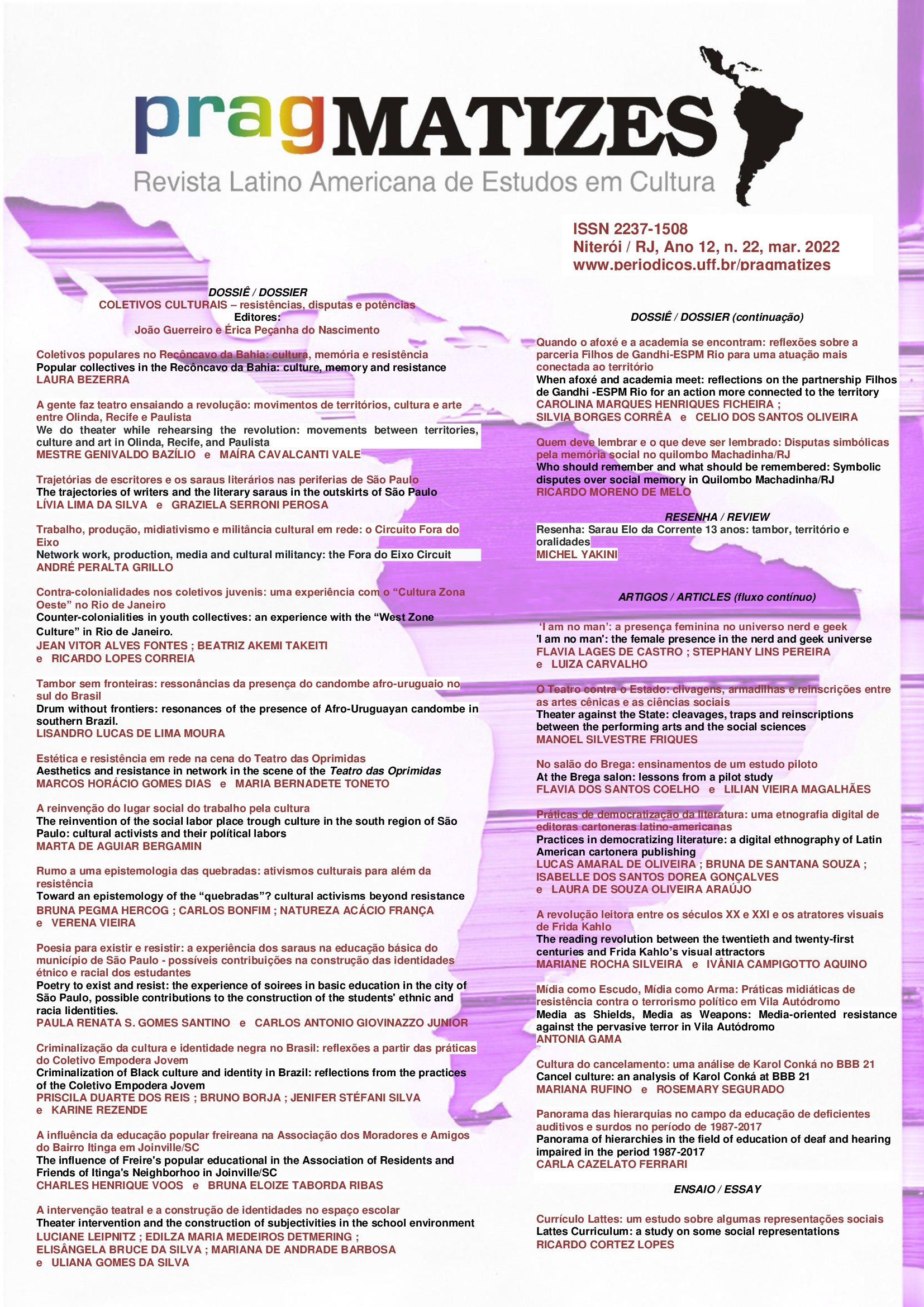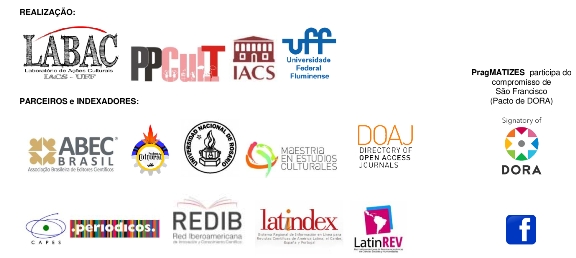Cancel culture
an analysis of Karol Conká at BBB 21
DOI:
https://doi.org/10.22409/pragmatizes.v12i22.51090Keywords:
social media, big brother brasil, karol conkáAbstract
Based on a case study of repercussion generated from the participation of rapper Karol Conká in the twenty-first edition of the Big Brother Brasil TV program, this paper investigates the cancel culture from the perspective of control and surveillance devices in the light of Foucault's theory in dialogue with Zuboff. A brief bibliographical review is carried out, bringing concepts that permeate the idea of cancellation. In a second moment, reality shows are discussed and, finally, there is an elaboration on the case of Conká, analysing it during and after the TV program. This article will address the debate on surveillance in digital networks, in addition to researching the impacts of the cancel culture on the democratic field.
Downloads
References
ADAMATTI, M. M. Crítica de cinema e patrulha ideológica: o caso Xica da Silva de Carlos Diegues. Famecos, Porto Alegre, v. 23, n. 3, set./dez. 2016. Disponível em: bit.ly/2I07RrZ. Acesso em: 16 out. 2020.
ALMEIDA, S. A cultura do “cancelamento” é a antipolítica por excelência. Portal Disparada, [S. l.], s/p, 21 de fevereiro de 2020. Disponível em: https://portaldisparada.com.br/cultura-e-ideologia/cancelamento-antipolitica/. Acesso em: 20 out. 2020.
BARRETO, Paulo; RIOS, Riverson. Vigiar e punir: a internet e as redes de poder participativo na era da globalização, XXXV Congresso Brasileiro de Ciências da Comunicação, Fortaleza-CE, 03 a 07/09/2012.
BATISTA JUNIOR, João. A escolha de quem participa do Big Brother Brasil não é casual. Desta vez, o programa reuniu um elenco customizado para causar. Debate por encomenda. Revista Piauí, 18 de fev. 2021. Disponível em: https://piaui.folha.uol.com.br/debate-por-encomenda/. Acesso em: 14 mai. 2021.
Cancel culture is the Macquarie Dictionary‘s word of the year for 2019. 2 dez. 2019. Disponível em: https://bit.ly/34fkJIF. Acesso em: 16 out. 2020.
CHENEY-LIPPOLD, J. A new algorithmic identity: Soft biopolitics and the modulation of control. Theory, Culture & Society, vol. 28, n. 6, p. 164-181, 2011. doi: 10.1177/0263276411424420
CHIARI, Breno da Silva et alli. A cultura do cancelamento, seus efeitos sociais negativos e injustiças. In: Encontro de Iniciação Científica do Centro Universitário Antonio Eufrásio de Toledo de Presidente Prudente. Anais. Presidente Prudente, v. 16, n. 16, s/p, 2020.
COLLAGUAZO-NARVÁEZ, Flor. ¿Qué tipo de activismo se realiza en la red social Facebook?. 2017.
COSTA R. Sociedade de controle. São Paulo Perspec, n. 18, p. 161-167, 2004.
DELEUZE, G.; GUATTARI, F. Micropolítica e segmentaridade. In: Mil Platôs (Vol. 3). Rio de Janeiro: Editora 34, 2004. P. 83-115.
DELEUZE, G. Conversações. São Paulo: Editora 34; 1992.
DUNKER, Christian. Quem tem medo do cancelamento? Gama Revista, [S. l.], p. 01, 26 jul. 2020. Disponível em: https://gamarevista.com.br/semana/ta-com-medo/o-medo-da-cultura-do-cancelamento/. Acesso em: 16 out. 2020.
EMICIDA. Principia. Sony Music Entertainment Brasil ltda. sob licença exclusiva de Laboratório Fantasma, 2019. Disponível em: https://www.youtube.com/watch?v=kjggvv0xM8Q&ab_channel=Emicida. Acesso em: 16 out. 2020.
EMICIDA. Twitter post. 01 fev. 2021. Disponível em: https://twitter.com/emicida/status/1356387176917925890. Acesso em: 16 out. 2020.
FOUCAULT, Michel. A Ordem do Discurso: aula inaugural no Collège de France, pronunciada em 2 de dezembro de 1970. São Paulo: Loyola, 2014.
FOUCAULT, Michel. História da Sexualidade I: A Vontade de Saber. Rio de Janeiro: Graal, 1988.
FOUCAULT, Michel. Microfísica do poder. São Paulo: Graal, 2009.
FOUCAULT, Michel. Vigiar e punir: história da violência nas prisões. Petrópolis: Vozes,1997.
HAN, Byung-Chul. A sociedade da transparência. Lisboa: Relógio D’Água Editores, 2014.
ILHEU, Tais. Tema de redação: como funciona a cultura do cancelamento. Guia do Estudante, [S. l.], p. 01, 5 ago. 2020. Disponível em: https://guiadoestudante.abril.com.br/redacao/tema-de-redacao-como-funciona-a-cultura-do-cancelamento/. Acesso em: 16 out. 2020.
KEEN, A. Vertigem digital: por que as redes sociais estão nos dividindo, diminuindo e desorientando? Rio de Janeiro: Zahar, 2012.
LAZZARATO, M. As revoluções do capitalismo. Rio de Janeiro: Civilização Brasileira, 2006.
LE MONDE DIPLOMATIQUE BRASIL. Reality shows: por quê eles têm tanta audiência? - Programa Le Monde Diplomatique #33. 2020. Disponível em: https://www.youtube.com/watch?v=tiEt8_eZYi8 . Acesso em: 14 mai. 2021.
LORDE, Audre. As ferramentas do mestre nunca vão desmantelar a casa grande. In: Second Sex Conference, The Personal and the Political Panel, New York, 1979. Disponível em: https://www.academia.edu/11277332/LORDE_Audre__As_ferramentas_do_mestre_nunca_v%C3%A3o_desmantelar_a_casa-grande. Acesso em: 20 set. 2020.
MAIS VOCÊ. Twitter post. 24 fev. 2021. Disponível em: https://twitter.com/MaisVoce/status/1364573754228146184
MELLO, Patrícia Campos. Introdução. In: A máquina do ódio: Notas de uma repórter sobre fake news e violência digital. São Paulo: Companhia das Letras, 2020.
MELLO, Patrícia Campos. Por que os brasileiros deveriam ter medo do gabinete do ódio. NY Times, [S. l.], s/p, 4 ago. 2020. Disponível em: https://www.nytimes.com/pt/2020/08/04/opinion/international-world/bolsonaro-gabinete-do-odio.html. Acesso em: 15 mai. 2021.
MOURA, Julia. BBB 21 vira vitrine para marcas mesmo não pagando investimento milionário das empresas. Folha de Pernambuco, 03 de mai. de 2021. Disponível em: https://www.folhape.com.br/cultura/bbb-21-vira-vitrine-para-marcas-mesmo-nao-pagando-investimento/182143/. Acesso em: 14 mai. 2021.
RHEINGOLD, H. Smart Mobs. The Next Social Revolution. Cambridge, MA: Perseus, 2002.
RODA Viva | Emicida | 27/07/2020. [S. l.: s. n.], [2020]. Disponível em: https://www.youtube.com/watch?v=pDV3SGzV3m4&ab_channel=RodaViva. Acesso em: 16 out. 2020.
ROSS, Loretta. I’m a Black Feminist. I Think Call-Out Culture Is Toxic. The New York Times, [S. l.], p. 01, 17 ago. 2019. Disponível em: https://www.nytimes.com/2019/08/17/opinion/sunday/cancel-culture-call-out.html. Acesso em: 16 out. 2020.
SCHWARCZ, Lilia. Filme de Beyoncé erra ao glamorizar negritude com estampa de oncinha. Folha de S. Paulo, [S. l.], p. 01, 2 ago. 2020. Disponível em: https://www1.folha.uol.com.br/ilustrada/2020/08/filme-de-beyonce-erra-ao-glamorizar-negritude-com-estampa-de-oncinha.shtml. Acesso em: 16 out. 2020.
SIBILIA, Paula. O show do eu. Rio de janeiro: Nova Fronteira, 2008.
SILVEIRA, Sérgio Amadeu da. Discursos sobre regulação e governança algorítmica. Revista Estudos de Sociologia, v. 25, n. 48, 2020.
THE GREAT Hack. Direção de Karim Amer e Jehane Noujaim. Filme original Netflix. 2019 (154 min). Acesso em: 24 jul. 2020.
TV BOITEMPO. Silvia Viana apresenta RITUAIS DE SOFRIMENTO. 2021. Disponível em: https://www.youtube.com/watch?v=gXn8ARNrtjY. Acesso em: 03 jun. 2021.
VIANA, Silvia. Rituais de sofrimento. Sâo Paulo: Boitempo Editorial, 2015.
WORD of the Year. 2019. Disponível em: https://www.macquariedictionary.com.au/resources/view/word/of/the/year/. Acesso em: 16 out. 2020.
ZUBOFF, Shoshana. Big Other: capitalismo de vigilância e perspectivas para uma civilização de informação. In: BRUNO, Fernanda (org.). Tecnopolíticas da vigilância – perspectivas da margem. São Paulo: Boitempo, 2018.
Published
How to Cite
Issue
Section
License

This work is licensed under a Creative Commons Attribution 4.0 International License.
By forwarding an original to PragMATIZES, the authors agree that the copyright related to it is transferred to the Publishing. Articles and other writings are made available in PDF format from their publication, and they can be downloaded to institutional repositories and personal pages, provided that with their proper bibliographic indication.



